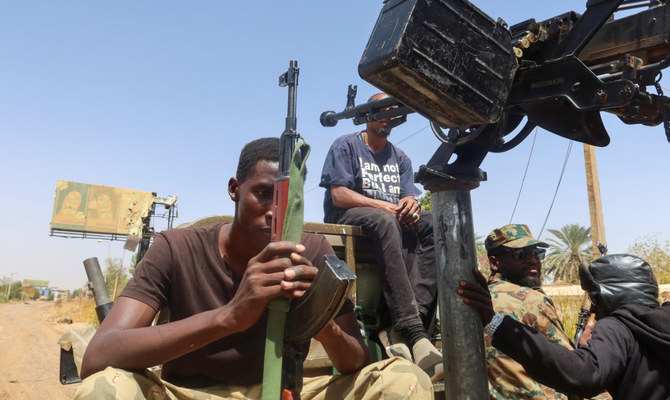DUBAI: The head of Sudan’s army has told troops it will press to take more ground after its most significant advance in an 11-month-old war against the paramilitary Rapid Support Forces, as a charity warned of a rising risk of hunger-linked deaths.
Army forces, which witnesses say have been boosted by recent deployment of drones, took control on Tuesday of the radio and TV headquarters in Omdurman, across the River Nile from Khartoum and part of the wider capital. The RSF, a rival military faction that has had the upper hand in the conflict, had held the area since the first days of the war in April last year.
Though broadcasting from the radio and TV building had stopped, the advance extended the army’s reach across the old center of Omdurman — strategically important because it hosts military bases and has been a transit point for RSF resupplies.
Witnesses said they had seen destroyed RSF vehicles and the bodies of RSF fighters near the broadcast complex on Wednesday.
“Our message to the Rapid Support rebels is that the armed forces and regular military services will go after you everywhere until victory is achieved,” army chief Gen. Abdel Fattah Al-Burhan told troops at the Engineer Corps base in Omdurman late on Tuesday.
The army would continue to fight the RSF in other parts of the capital, and in the western region of Darfur and El Gezira state south of Khartoum — areas where the RSF made swift advances late last year — “until complete victory is achieved,” Al-Burhan said, according to a statement issued on Wednesday.
The army also released a video showing Al-Burhan stopping in a convoy of Land Cruisers with heavily armed guards to break his Ramadan fast with residents on a roadside in Omdurman.
The army has signaled it will not consider international appeals for a ceasefire during Ramadan unless the RSF agrees to a major military withdrawal.
The war, which broke out over the terms of a plan for a political transition from military rule toward free elections, has caused more than 8 million people to flee their homes, creating the world’s biggest displacement crisis.
The number of Sudanese estimated to be facing crisis levels of hunger — one stage before famine — has more than tripled in a year to nearly 5 million.
Some in Omdurman have struggled to access food, though the army’s recent gains eased the situation in at least one area.
On Wednesday, the international charity Save the Children said that about 220,000 severely malnourished children and over 7,000 new mothers in Sudan could die in the coming months from hunger unless more funding for humanitarian relief is provided.
Relief efforts have been badly hampered by denial of access and looting of aid supplies.
Fighting has also brought down the supply chain within Sudan for foods used to treat severely malnourished children, according to Save the Children.

























